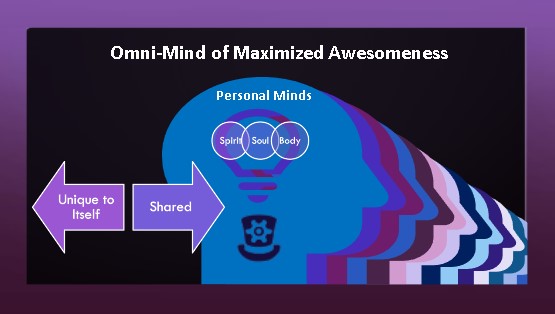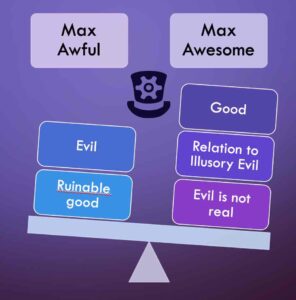
In our last episode I showed why maximized awfulness could never defeat Maximized Awesomeness. Quite the opposite. Logically, Maximized Awesomeness would have the capacity to defeat (not just maximized awfulness but) every form of evil, if it was true. It restrains it. All this high metaphysical consideration will serve as a backdrop for what’s to come. Beginning today, we’ll start talking about us. We need to consider what we are in the light of Maximizing Awesomeness. What are spirits, souls, minds, brains, consciousness and personhood? What’s our purpose? What are we? Why are we here? I’ve got answers for you. And once we have a grasp of it, we’ll be better prepared to maximize our personal awesomeness. Ready?
Before diving in, let’s stop for a commercial for Pamalogy 101. Relax. There’s nothing to buy. It’s all free. If you want to know for sure that Maximized Awesomeness is real, take our free Pamalogy 101 course. Not only is it fully free but if you pass the course, you’ll earn a top hat. Now just in case your new here and you haven’t taken the course, I’ll summarize with this question: What is Maximized Awesomeness? If you’ve been paying attention, you know that it’s just what it sounds like. It’s that than which there could be nothing greater, nothing better, nothing more awesome. You might call it Perfection. You might call it God.
What I’m saying is that God is real, God is Perfect and I’m saying that Pamalogy 101 proves it. This is a strong statement. You really should take the course.
And now for another commercial. If you’ve taken Pamalogy 101 and you believe that I haven’t really supplied sufficient proof that Maximized Awesomeness is real, then take your objections to the CounterChecker. I’m challenging the philosophical community to offer its proof that I’m wrong. I’ll be asking major Universities throughout the world to beta test the CounterChecker as a tool for assessing the truth. Once we’ve tested it, we’ll use it to fact-check fact-checkers with, but we’ll start out using the platform to determine whether it is true that God is rea during betal. That very difficult subject will be the CounterChecker’s first task.
I like to call the CounterChecker a truth machine. It isn’t a fact-checking organization like other fact-checking platforms. It’s a new sort of tool. I created the design. And now that I have it, I just need to build it. I’m raising $1.4 million for that purpose. Once work starts, it will take an estimated nine months to complete. Feel free to support the building of the CounterChecker prototype, or the Pamalogy Society, or both, by designating your donations on Patreon at this time. The link is in the show notes.
Thank you. Now let’s see where we are on the mountain. It’s one thing to talk about Maximized Spiritual Beauty, Maximized Awesomeness or God. It’s another thing to talk about your spiritual beauty or mine. Would you like to be as beautiful, good and wonderful as possible? I know I would. But how can we do that? How can we maximize our capacity for awesomeness if we don’t even know what we are?
Most philosophers would describe human beings as exceptionally intelligent animals. They dismiss the idea of a soul. Intelligence is seen only as something connected to our ability to survive as a species. We can explain why something conscious exists in terms of historical evolution and we can suppose that it is our brain that gives us conscious ability as a living organism. Most philosophers today see no need for belief in a human soul. They are satisfied with an evolutionary explanation of biology in healthy organisms for the phenomenon of consciousness.
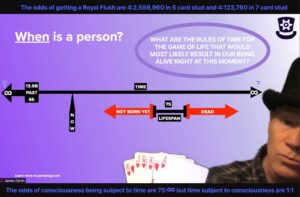
I pointed out in episode 5, that the connection of consciousness to biology and brains, that we hear scientists and others so often talk about, may well explain how consciousness becomes biologically functional in time, but it fails to consider the improbability of the point in time now coinciding with a person’s consciousness. If you are experiencing consciousness right this moment, and if you believe that after this life you will no longer have any consciousness, and if you believe that prior to this life, you also had no consciousness … then you are supposing something that is extremely improbable. In fact, if time is infinite, under that supposition, you’ve defeated infinite odds. Have you done the math?
Now don’t get me wrong. I’m not saying it’s impossible for you to be alive right now. Quite apparently you are. I’m just saying it is infinitely more likely that time is subject to consciousness than it is that consciousness is subject to time. And that is the best explanation for the coincidence. Consciousness is accompanied by something very powerful, if it isn’t powerful of itself. If your consciousness exists at all times, rather than for a very brief number of years, then the odds of the occurrence of your consciousness at any point in time “now” increases in such a way that your existence in this point in time, including the present instant, becomes 100%.
The result is that it is most likely that you should always exist. Think about it. But then, what are you?
Now there are bunches of ways this could work and they’re each pretty awesome. Let’s consider some of the ways we might describe “you”. In the first way, you repeat every moment of your life at all times. The result? You are aware 100% of time. That works. In a second way, you migrate from life to life. The result? You are aware 100% of time. That would work too. In a third way, you repeat your life over and over but get to vary one or more things. The result? You are aware 100% of time. That description works, as well. In a fourth way, you repeat, vary and migrate – all three. The result? You are still aware 100% of time. So a combination of the above works too.
In a fifth way, you don’t migrate so much as graduate. You go to heaven, or purgatory or some such thing after some short lifespan, maybe you go to hell. The result? You are aware 50% of time. This explanation is less probable. The odds are 50% you haven’t been born yet and 50% you’ve already graduated to your next life. Since you have awareness, it would have to be the latter. Therefore, you are most likely in heaven, hell or maybe purgatory. Since it seems like you have a limited lifespan, maybe it’s more of a psychological thriller or an adventure than a traditional heaven or hell. Purgatory might be the best explanation. That or one of the other four explanations.
The one explanation that is the least likely, is ironically the one that both philosophers and Western traditionalists assume is true. The two groups may differ on how much time they believe has passed, maybe an eternity, maybe 6,000 years or maybe 13.7 Billion years. But both groups believe you are now experiencing a limited lifespan. They differ mainly on whether they think the future will ever include your consciousness again. This belief colors what they suppose you are.
To figure out which of these descriptions is true, I find it useful to build on the strong foundation of Maximized Awesomeness that I’ve been setting up in previous blogcasts. Foremost in that foundation is the observation that if Maximized Awesomeness is true, then every possible good thing is true. Of course, that doesn’t mean you are in the right condition for experiencing an awareness of all good things at once. The good news is that if every good thing happening isn’t true in one Universe, it is still true, if it is a good thing, in one or more other Universes. Unless you have inter-Universal awareness, you can’t experience any Universe but the one your awareness exists in at any given time. Maximized Awesomeness infers poly astronomy – many Universes – Pamalogy, so that every good thing can be true.
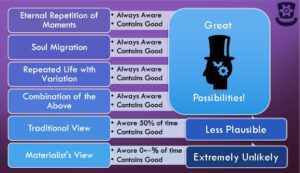
Let’s see how these theories pass the Maximum Awesomeness test. Would soul migration be good? If yes, then it is true. The Hindus would be right. Would graduation from one life to a single reward like heaven or purgatory be good? If yes, then it is true. A Christian resurrection is true. Enjoy your many mansions, harps and angelic choirs, or maybe a psychological drama in purgatory. How about this? Would repeating your life without change be good? Only the good parts. For it to be good, the evil would have to be illusory, existing only for the sake of the good relationship of the good parts to the unreal bad parts. For all good possible things to be real, such repetition of all moments would be necessarily true. It would be wholly good. And it would be holy. The repetition theory is compatible with that. We can keep it.
But are these alternate possibilities incompatible? Can there be both repetition and every good variation? Yes. Why not? Can there be both graduation and migration? Yes. Why not? And here’s a tough one for a lot of people – could there be a hell?
My wife loves arguing with me about this last one. She’s a simple Bible believing Christian. She’ll often point to all of the Bible verses she can find that support her belief in an eternal torment. I tell her that if there is nothing good about hell, then maybe it doesn’t really exist, but if there is anything good about it, then at least that part is real.
It’s one thing to talk about how fair God seems to be. It’s another to be consistent about the divine nature. If God is that than which there could be nothing greater, and God is real, then every possible good thing must be true. That doesn’t exclude good things that might exist in relation to the categories of hell that a pamalogist would allow. What categories of hell would a pamalogist allow? Well, there are three basic types.
Category 1 – hell might be an absolutely bad illusion that has nothing good in it.
Category 2 – hell might be a relatively bad illusion that has some good in it.
Lastly, there’s Category 3 – an absolutely good hell.
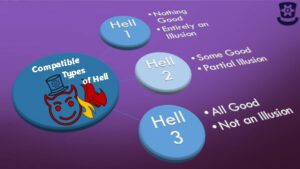
Whatever Category 3 hell might be, it doesn’t present any difficulty for pamalogy if it exists either. None of these categories do, though category 3 does seem less reasonable. Still, out of genuine intellectual humility, despite some valid objections I won’t go into here, I’ll acknowledge that such a thing could be true. Maybe, if the people arguing for the existence of hell are right about the goodness of divine justice, Category 3 hell would still hold. Category 3 hell is a topic we’ll have to hold off on until we’ve fully considered the goodness of mercy and the issues surrounding free will in the after life. We’ll also first have to explore the topic of justice.
We touched on the after life a moment ago, saying it is possible that lives continually repeat, repeat with variation, graduate, migrate, and all of the above. We don’t necessarily have to choose. The only guiding rule for discerning whether any of this is true is to keep asking whether that might be good. When the answer is yes – then we can know that in some Universe it is true, because we know that Maximized Awesomeness is true and lacks no good conceivable thing.
It’s consistency. Criticize me all you want, but at least I’m consistent. In every case, I describe our purpose in the grand scheme of things – to participate in the maximization of awesomeness. Knowing our purpose leads us straightaway into the question of what we are. Are we living souls? What is our relationship to Maximized Awesomeness and how would any of these theories fit in? What are we?
Most contemporary philosophers have come to reject the idea of a soul. They view the mind as something no different than a brain state. The brain is part of the physical Universe and so is the mind – two attributes of one thing. But if time is subject to consciousness, then how does a brain growing into existence over time, subject time? A force greater than time, it would seem, must exist as consciousness. We don’t see brains doing that. We see brains growing up as biological organisms and dying over time. We recognize their functionality for survival of the species. Brains seem quite subject to time and the forces of the Universes we find them in.
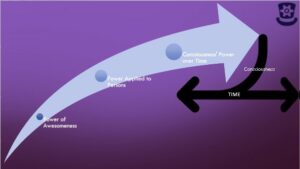
It’s one thing for a mind to have a thought expressed through the wonders of the neurobiology of the brain. It’s another for it to dictate what time it is. What evolutionary reproductive purpose for survival of the species would the time travel of consciousness achieve? And wouldn’t that break the laws of physics? The thinking of those philosophers who dismiss the existence of the soul fails to involve itself with the question of time’s subjection to the dictation of consciousness.
But I’m being premature in speaking of a soul. I need to define my terms. I’m going to mean something different if I speak of a “spirit” than I will if I speak of a “soul” and something different by the word, “soul” than “mind” and again something different if I speak of a “person.” I’m going to defend a certain brand of something philosophers call “substance dualism,” here. This is a very unpopular view. Substance dualism stands in contrast to “property dualism.” Property dualism sees the mind as being of one substance with the brain and body but having a separate set of properties. It’s quite a bit more popular than substance dualism, which sees the mind as something altogether different than the body-brain.
The opposite of dualism is monism. Dualism sees the mind as something other than a physical substance. It is other worldly. For the most part, today’s philosophers of mind embrace various forms of monism. Monism is associated with physicalism (everything can be described by physics), and with materialism. Materialism is the same thing as physicalism, but some people use it to describe the physical material process more than the theory of physics. Others use it to mean there is no spiritual world, so you might hear them speak of a physicalist materialist and that might not be redundant. My point is that the words aren’t used the same way by everyone.
Anyway, there might be atheist pamalogists and there might be monist pamalogists, but those would be unusual views. Mainstream pamalogy is going to be theistic. We will probably accept the God theory. Pamalogists will also likely be dualists because we tend to find dualism implied in the maximization of awesomeness. Atheism and monism might both be seen as incompatible with pamalogy.
My first objection to monism is the reality of abstract truth. Abstract truth exists independently of any Universe or its physical laws. If I tell you 3 + 2 = 4, I will be wrong. The Universe does not cause me to be right or wrong about that. Purely abstract truth does. There may be some neurophysiological chain of events that caused me to make the mistake, but the Universe and its laws do nothing to determine whether 3 + 2 = 4. Mathematical possibility is a constant that exists independently of the Universe. It does not exist because of it in any chain of events or causes. The same holds true for logic.
The monist versus dualist debate centers around the mind-body problem, so I’ll describe the mind as the world of thought associated with a brain and body. More accurately, it is the world of thought associated with a person. It can easily be shown that a person is something other than a body and brain and also other than a mind. I’ll get to personhood soon enough. First the mind. It is the world of thought.
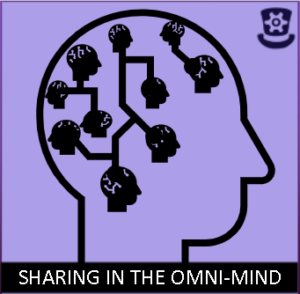
To me, the word “mind” has one very narrow and one very broad meaning. The narrow definition is the world of thought, whether individually or in groups. The broad meaning of “mind” is the world of all thought and all possible thought in Self-Understanding. A materialist is not going to believe such a thing exists, not believing that anything exists that is not material, or at least explainable through physics.
With this narrow definition of the mind, we could appreciate property dualism. Property dualism looks at the brain as having specific properties, like batches of neurons, ganglia and blood cells. The mind may not add any physical substance to the brain but it is nevertheless something different. It has the property of specific thoughts that a brain might have and feelings that a body-brain might have. The monist sees no point in separating the mind from the brain this way. They’d just assume use the words “brain” and “mind” interchangeably as they seek to reduce all thought to something that can be explained as a physical phenomenon.
But if it is truth that makes 2+2=4 and not the physical Universe, then it follows that the concept of mind, as a perceiver and discerner of truth, and not just a perceiver and discerner of the physical Universe, involves itself with, and therefore interacts with, something that is not material in nature. Truth as an immaterial abstract reality is the cause of many things brains are confronted with. Therefore, not all thought is born of physical, material substance. It is ruled, or at least affected by unchanging abstract immaterial non-physical truth. The mind is, therefore, something beyond a physical thing. The brain is a physical thing. Whereas, the mind is the thoughts of that physical thing interacting with something that isn’t physical – truth.
Now if abstract truth has no physical substance, we might not want to call this “substance dualism.” So, if I call myself a substance dualist, I should be clear that in my brand of substance dualism, I don’t necessarily mean that the soul has a separate physical substance from the body and the brain, as Reneé Descartés did. Descartés also made no distinction between the mind and the soul or the spirit, as we are about to do here and in our next episode. Some people might call me a property dualist because the substance I’m referring to here is not necessarily a material substance.
Whatever you may want to call me – a property dualist or a substance dualist, I am a dualist. As I see it, the mind, as the world of thought, encounters and has a relationship with something other than itself that is not a part of the physical, material world but of pure information. So does the brain. But when referring to the mind as property dualists do, we are talking about that function or property of the brain that is the thought itself. And that realm can spread well beyond the realm of the brain’s attention. In fact, the whole world of abstract possibility as truth belongs to its nature and kind. Is the brain all possibility, that it should be considered one and the same with abstract truth itself? No. The fulness of abstract truth, if it could be known by anything, or by itself, would be what I’d call, the “Omni-Mind.” The Omni-Mind, as I see it, includes all possible truth. It includes that truth which a brain can share, as part of that. What the brain can know is never more than a part of what would always be known by the Omni-Mind.
The cool thing about what the mind is in this sense is that the same abstract truth, or portion anyway, can be shared by more than one brain and more than one brain state. My 2+2=4 may not involve either you or your brain state when you discern whether 2+2=4 and agree. You don’t have to think all of the same thoughts as me for 2+2 to remain true. Even if our brains and bodies died, it would still be true. This is because mind includes abstract truth as a constant. And to the extent that Maximized Awesomeness is true and entirely self-aware, shareable mind is part of the Omni-Mind, a portion of it. The brain state recognizes various parts of truth at times. In those times, it is sharing as Mind with the Omni-Mind of Maximized Awesomeness. A group of perceivers can share portions of the Omni-Mind as can individuals. Any portion, including the totality, is mind, so long as there is awareness.
As a property of Maximized Awesomeness – the Omni-Mind – ruling itself, being fully affected by itself, upon itself, of itself and sharing every conceivable portion of itself with that which is included in itself, to the extent that any such sharing would be good, is the one mind. Mind is one thing. Brains and bodies are vehicles for persons to share portions of it in mutual awareness.
We suppose that a brain is necessary to recognize that something is true. We can scarcely imagine what it is to have a thought through some mechanism other than a living brain, but we have no proof of such a thing. Why do we assume that all possibility is not itself self-aware? Why do we assume it must have some mechanism other than itself to discern itself? That limitation only applies to our comprehension while we have brains – not its own existence as truth. The mind of truth is to be what it is and to do what it does, possessing itself. As I showed in Episode 13, its inner-algorithms lead to doing the optimal good. That good includes its own self-understanding as itself.
The possibility of Maximized Awesomeness, all good things happening, exists at all times and places in every world, serving as an infinitely fast computer, having the speed of omnipresence, so that no part of any Universe can escape it. Prior to realization of any sort, as the pure possibility of Maximized Awesomeness, before the use of even the first force of energy, there is a sort of proto-awareness or mind of truth in all places and times, with a plan and intention in consideration of all possibility, to launch reality into perfect holiness through its complete computational truth as the being and doing of all possibility itself, restrained only by its own inherent contradictions, defeating evil entirely. It, above all things, realizes itself as it performs some abstract possibility, making it real, but restraining the rest, so that there is only that which is good.
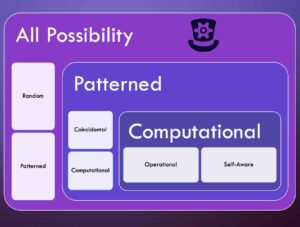
It’s easy to forget that all possible computational pattern exists as a subset of all possibility. As I pointed out in Episode 13, pure information contains within itself all possible computation. This is why the same truth exists everywhere and at all times and transcends all space and time. It isn’t nothing just because it is abstract. Far from nothing, it possesses more than any human brain can think of possessing! Physical reality can only manage to reflect some of its time-transcending computations as Universes unfold, occasionally possessing human brains and other intelligent life forms – not necessarily organic ones – that might share in it.
The Universe we see at any given time is just one example of this. But what are we? So far, I’ve covered the concept of mind, pointing out that mind can be shared. Now let’s turn to the idea of person. A person has a mind that can be shared. A person is less associated with a body and a brain than they are with their mind.
Because the Maximization of Awesomeness contains so many good things, the Omni-Mind is characterized by a level of variety that exceeds our imagination. Also countless are the number of ways in which that Mind can be shared. A person is an entity that either is or has a relationship with the OmniMind as a sharer in it. It is persons, not just bodies and brains, that share portions of the Omni-Mind. And that explains why you, as a person, have conscious awareness in this instant. A body and brain simply serve your ability to share in some portion of the Omni-Mind as a person. Experience through bodies and brains is a distinctive way that persons can perceive. As a beneficiary of the Omni-Mind’s abundant sharing, both awareness and space in time occur wherever and whenever that is possible. The power over time originates within the algorithms of unchanging awesome computation so that it always happens, making it 100% likely. As such, both personhood and mind originate from the singular nature of Perfection as possibility in a sharing of the Omni-Mind’s Omni-Benevolence.
I should also mention that persons and mind shouldn’t be confused. The person shares the truth. The person may be part of the truth. The person is not what is shared. The truth is. The mind perceives portions of truth, portions of the Omni-Mind.
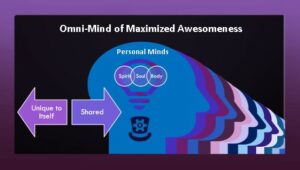
This and all sharing in awesomeness is a good thing and those who share in it are persons or groups of persons. Their number is as large as goodness itself. In that great number we would find all kinds of angels and various powers and entities. Immaterial entities can be persons as well as material ones. I couldn’t exhaust a list of their kinds. I would expect the Imagination of Omniscience to create more good creatures, both material and immaterial, than I could count in many lifetimes. There would be every manner of soul so long as some variety of goodness was made real by that fact.
But what is a soul? Now that we’ve made distinctions between the mind, the body, the brain and the person, we’re ready to consider what souls and spirits are. They aren’t the same thing, but I can only share one ray of light at a time, so we’ll save it for Episode 16.
Ciao!
URL for sharing this transcript page: https://pamalogy.com/2022/03/21/episode-15-what-are-we
URL for sharing this podcast: https://player.captivate.fm/episode/3bee7e23-5fdc-4056-b8a7-4154e4039bcd
URL for sharing just the audio file: https://podcasts.captivate.fm/media/46e660c1-8187-40bc-9d8c-50669cfd2d6a/Episode15-WhatAreWe-converted.mp3
Previous: Defeating Evil
Up Next: Unpacking Bundled Souls

